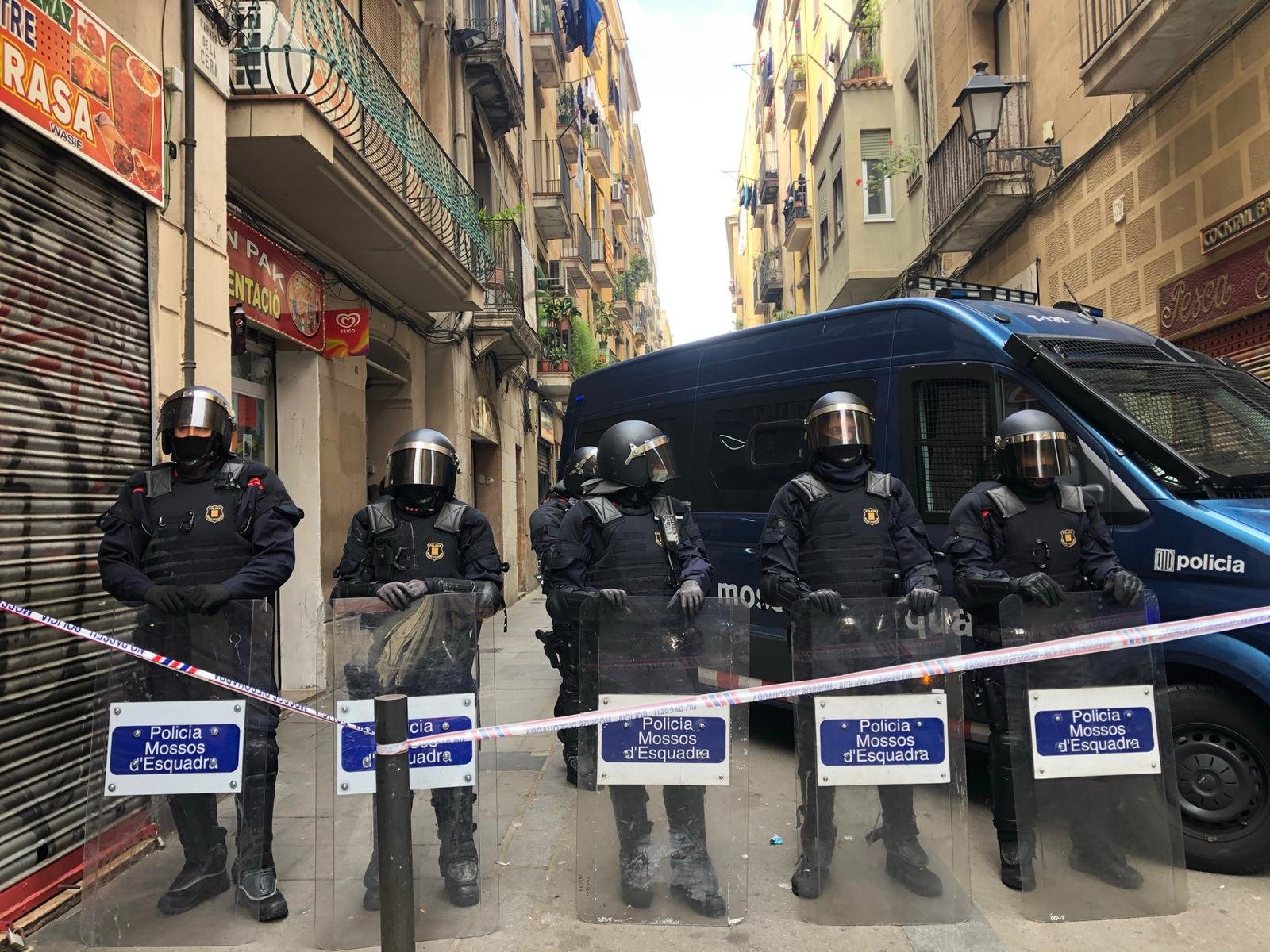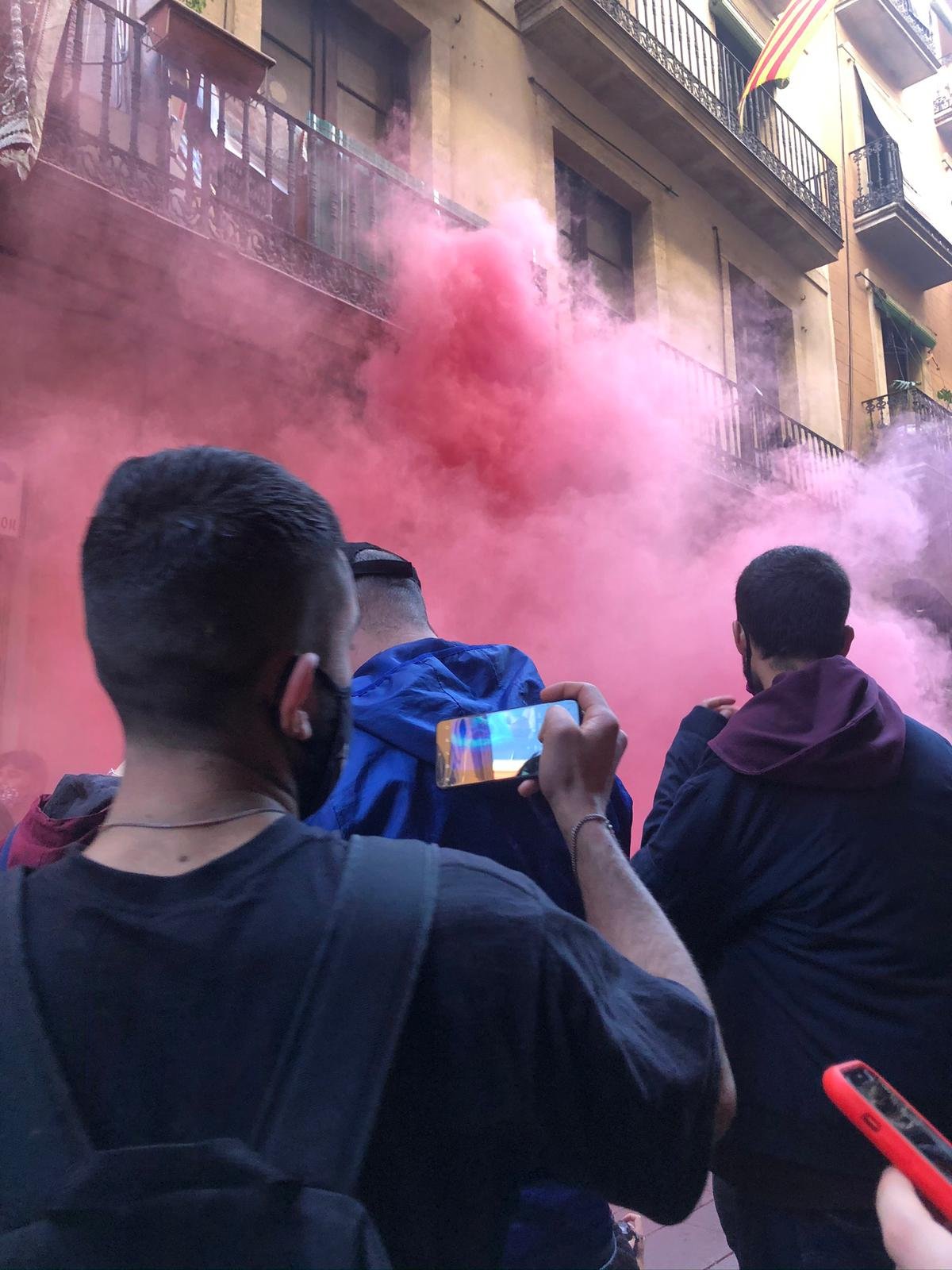Barcelona eviction crisis: in today’s world, a right to housing equals a right to life
A line of Mossos d’Esquadra blocking off an eviction in Barcelona’s old town. (Credit: Scarlett Reiners)
We all probably think of Barcelona as a tourist mecca before even we remember that it is a major European city in its own right. A place known for its distinctive architecture, all-night parties and sandy beaches; it is hard to imagine that there is anything more menacing to Barcelona than its pick-pocketing problem. However, just one street away from the iconic Rambla, loaded with stalls selling tourist tat, half a dozen police vans have cornered off an alleyway in el Raval to remove yet another vulnerable family from their home.
In Spain, Barcelona is the place where the most evictions take place (on average, 18 per day). It is also the Spanish city with the highest number of squatters. As is the case in most major cities, speculation in the housing market has led to rising prices which has made housing increasingly inaccessible. In fact, the cost of rent increased 30 times more than salaries in the five year period leading up to the pandemic. Whilst families able to prove vulnerability are entitled to public housing, a limited stock means that the waiting list is incredibly long, and shelter is made inaccessible. The promise of social housing is an empty one. For the increasing number of people left without an alternative housing option, eviction means more than homelessness - it means life on the streets.
A means with only one end
Living on the streets can also result in death. In just one night in January of 2021, two men froze to death on the streets of Barcelona. Horrified by this damning fate, sometimes people facing eviction take matters into their own hands. In May, during an eviction of four flats in the el Raval district (allegedly for the construction of tourist apartments), on hearing the police banging at her door, a mother stabbed herself in the stomach. In June, a man living in the Sants district committed suicide as the judicial entourage appeared at his door to evict him. Faced with an instability that is completely non-conducive to life, that is ‘life’ on the streets, death is seen as the inevitable, or perhaps preferable, outcome. Eviction and ending one’s life, clearly, are not such dissimilar or inseparable processes.
But what about squatting? This is perhaps the main, apparently hopeful, alternative to life on the streets for vulnerable people excluded from a social housing option, particularly for those living undocumented. Although, this unregulated accommodation has proven to be equally unsuitable for life. In November, a family of four, including a one-year-old and a three-year-old occupying a flat in Barcelona’s Plaça Tetuan, died in a fire. The mayor of Barcelona and eviction activist, Ada Colau, emphasised that "This was a bank office, not a home." In this case, these people were denied the right to housing and thus denied the living conditions conducive to a right to life.
Barcelona, a lively tourist city, simultaneously deprives its most vulnerable residents of life. The thriving tourism industry, which leads to long term residents being evicted and priced out of their neighbourhoods to permit the installation of tourist flats, is itself at least partly culpable for the city’s housing crisis and homelessness issue. Housing, like education and health, is a basic, fundamental human right and should be respected as such. It is perhaps even more basic since, as an analysis of Barcelona’s crisis demonstrates, deprivation of the right to housing often means the deprivation of a right to life. Homelessness, fundamentally, is a condition not conducive to life, and eviction is a process not so different from assisted suicide, when suicide is the only option.
Hope for the future
In spite of these tragic events, there is hope for the future of Barcelona’s eviction crisis. Over recent years, local housing unions (sindicats) have sprung up across the city to defend the right to housing, with most of their efforts directed into preventing evictions on a day-to-day basis. Their presence is needed to complete this picture.
The Sindicat protesting an eviction.
Whilst you may not see the eviction happening in the shadowy backstreet in el Raval, it becomes harder not to hear the dozens of locals shouting “cap veïna fora del barri!” (no neighbour out of the neighbourhood!), or “força sindicat!” (power to the union!), echoing throughout the old town. You may even hear music blaring from speakers or see coloured smoke reaching above and beyond rooftops.
Across the city, multiple evictions are prevented or delayed by organized, non-violent resistance on doorsteps, by physically preventing the police from entering the property and carrying out the eviction process. This proves how significant the role of local activism and organization is in shaping society, but most importantly, in the everyday saving of lives. As governments internationally deny their citizens the right to housing, perhaps we should look to Barcelona as an example of how to respond to crises, of how to take care of our neighbourhoods, and how to make awareness of such issues unavoidable.

